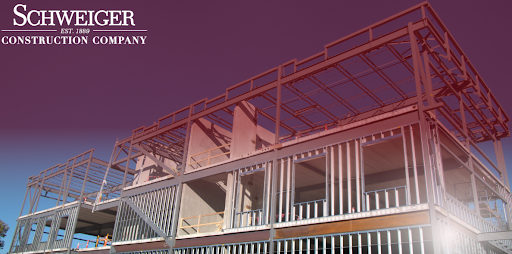At Schweiger Construction, we’ve seen firsthand how technology has transformed commercial construction over our 130-year history. Today, we’re exploring the innovations that are making our industry more efficient, sustainable, and impressive.
AI and BIM: The New Foundations of Construction
Artificial Intelligence (AI) and Building Information Modeling (BIM) are leading the way in construction technology. According to the “Artificial Intelligence (AI) in Construction Market Analysis” report published in 2024, the AI in Construction Market is estimated at $3.99 billion in 2024 and is expected to reach $11.85 billion by 2029, growing at a CAGR of 24.31%. AI is transforming every stage of construction, from design and preconstruction to operations and asset management. By leveraging AI technologies, construction companies can streamline operations, improve efficiency, and significantly reduce costs.
Key benefits of AI and BIM in construction include:
- Speeding up project timelines
- Reducing on-site errors
- Lowering costs and enhancing client satisfaction
AI technologies also offer enhanced safety measures, mitigating risks by monitoring interactions between workers, machinery, and items in real-time. This allows for early detection of potential safety issues, design flaws, or productivity problems. For example, in the pre-construction phases, AI enhances capabilities for building information modeling and generative design, enabling advanced planning and design processes.
Drones in Construction
Drones have become essential in modern construction. They can survey sites quickly and safely, monitor project progress with aerial photos, and inspect hard-to-reach areas without risking worker safety. The use of drones has led to:
- More accurate site documentation
- Faster site surveys
- Enhanced safety through remote inspections
Advanced Materials: Building Stronger, Smarter Structures
New materials are changing construction for the better. Self-healing concrete can repair its own cracks, smart glass adjusts its opacity based on sunlight, and nano-materials make structures stronger and lighter. These materials improve building performance and support sustainable practices, ensuring that structures are more durable and environmentally friendly.
Virtual and Augmented Reality: Bringing Projects to Life
Virtual Reality (VR) and Augmented Reality (AR) are revolutionizing how we visualize and plan projects. Clients can take immersive walkthroughs before construction starts, workers can train in safe, virtual environments, and digital information can be overlaid onto real-world sites for better decision-making. These technologies lead to:
- Higher client satisfaction due to better visualization
- Fewer on-site errors
- Improved collaboration among team members and stakeholders
The Future of Construction
As the construction industry evolves, integrating these technologies will be crucial. Companies that adopt these innovations will be able to work more efficiently, collaborate better with team members and stakeholders, and deliver higher quality results more quickly and accurately.
Schweiger Construction is committed to remaining at the forefront of these technological advancements. By leveraging AI, BIM, drones, advanced materials, and VR/AR technologies, we are building a better, smarter, and more efficient future for commercial construction. As these technologies continue to advance, we look forward to pushing the boundaries of what’s possible in our industry, continuing the tradition of innovation that has defined our company for over a century.





